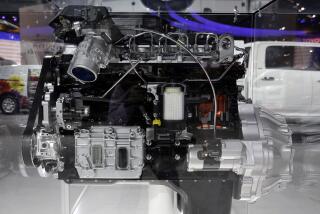Japan Firms Cited for Dumping Chips : Commerce Dept.’s Preliminary Ruling on Memory Devices Hailed by Silicon Valley
- Share via
Japanese companies have been dumping certain kinds of computer chips on the U.S. market, the U.S. Commerce Department ruled Tuesday in a preliminary finding.
The determination, the second of its kind in three months, strengthens U.S. companies’ hopes for protecting their dwindling share of the $22-billion worldwide semiconductor market.
The three Silicon Valley companies that filed the anti-dumping case hailed the decision as the U.S. government’s most decisive stand yet against what they call 15 years of unfair trading practices by the Japanese in dozens of industries.
The finding means that the United States, believes the companies--most notably NEC, Fujitsu, Hitachi and Toshiba--have been selling the chips in the United States at less than fair market value. Fair market value is calculated on a complicated formula that includes production costs and prices at which the product sells in the manufacturer’s home market.
Duties Imposed on Firms
The ruling, which imposes duties against the Japanese companies on the basis of the calculated dumping margins, applies to EPROMs, or eraseable programmable read-only memory chips. They are one kind of semiconductor--the tiny electronic circuits that are the basis for all electronic goods, ranging from computers and microwave ovens to the most sophisticated weapons and military equipment.
The three U.S. firms that filed the suit last Sept. 30--Intel, Advanced Micro Devices and National Semiconductor--together make about 60% of all EPROMs sold.
In 1985, sales of EPROMs in the United States totaled about $405 million, just less than half of the $880-million worldwide market, according to estimates by Dataquest, a market research firm in San Jose. Japanese companies controlled 25% of the sales in the U.S. market in 1985. But the Japanese makers have continued to take over various segments of the semiconductor market, and some U.S. companies have withdrawn completely from manufacture of certain chips.
Last Dec. 3, the Commerce Department issued a preliminary determination that six Japanese companies had been dumping another kind of memory chip, known as a 64K DRAM (dynamic random access memory).
A ruling in the third chip-dumping case--one initiated by the Reagan Administration and involving larger-memory DRAMs--could be made by the Commerce Department as early as the end of this week.
Analysts Hail Ruling
Analysts said the earlier ruling came too late to do much good for U.S. makers of 64K DRAM chips, but Tuesday’s ruling will give EPROM makers some breathing room.
The Commerce Department expects to make a final determination in the EPROM case by May 27. In that finding, the department could reverse its preliminary decision--but that is not likely--and may adjust the import duties.
The case then goes back to the International Trade Commission, an agency of the U.S. government, which will rule within 45 days on whether the U.S. companies have been materially injured. If the ITC finds such injury or threat of injury, the duties will remain in effect.
Tuesday’s ruling said that NEC, the electronics giant that is now the No. 1 worldwide seller of all kinds of computer chips, was dumping EPROMs at estimated margins of 188%. If a company sells for 50 cents a chip whose fair market value is $1, that is considered a 100% dumping margin.
(NEC refused to respond to inquiries, and the department used “best available” information to calculate the margins.)
The department said Fujitsu’s dumping margin was 145.9%, Hitachi, 29.9%; Toshiba, 21.7%, and all other Japanese makers, 63.1%.
The duties, which must be paid in cash or bond before the Japanese companies can sell their chips here, will be equivalent to the dumping margins. Under this finding, for every $100 worth of chips Fujitsu exports to the United States, it must pay $145.90 in duties.
The U.S. semiconductor industry also is paying close attention to patent infringement suits filed by Texas Instruments, another large U.S. maker of semiconductors, against eight Japanese and one Korean company.
The ITC voted Monday to investigate the TI charges.
More to Read
Inside the business of entertainment
The Wide Shot brings you news, analysis and insights on everything from streaming wars to production — and what it all means for the future.
You may occasionally receive promotional content from the Los Angeles Times.










